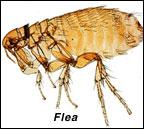
Just like people, pets can get allergies! It’s that time of year again in Perth County – we are seeing flare-ups in allergy-prone pets. Signs can be as subtle as feet licking or can be as severe as pets chewing themselves raw. Allergies occur when the immune system overreacts to what is typically a harmless substance. Usually the cause of the allergy is some sort of protein. The immune system overreacts to the protein and causes substances to release that can lead to intense itchiness and inflammation of the skin.
What are signs my pet has allergies?
- Feet licking
- Bum scooting/chronic anal gland issues
- Itchy ears/chronic ear infections
- Red/itchy/ulcerated skin
- Itchy skin around head and ears in cats
- Itchy/watery eyes
- Coughing/sneezing
- Diarrhea/vomiting
What is causing my pet’s allergies? How can allergies be treated?
There are many different types of allergies. Your pet can have one type of allergy or a combination of a few. More often than not, a pet with one allergy tends to be prone to developing others.
Flea allergy dermatitis (FAD) is an allergy to flea saliva. While all pets will be itchy with fleas, those with FAD have severe reactions, sometimes to the point where the skin becomes very inflamed and painful. The most common area you would see this is in the lower back area near the base of the tail. However, other areas can also be affected. This allergy tends to worsen with age and with more flea exposure.
Treatment involves regular flea prevention medications. It is best to use a veterinary specific medication as there is guaranteed efficacy of the products when used properly. Prevention is the best approach as even a single flea bite can cause a severe reaction. Some dogs with severe reactions may also benefit from other medications from your veterinarian that can help stop the itchiness. Some may even require antibiotics for bad skin lesions.
Atopic Dermatitis
Atopic dermatitis (Atopy) occurs when your dog or cat is allergic to environmental allergens. These allergens include pollen, mold, dust mites, and grasses. These allergens are all over the environment and impossible to avoid. Your pet can be exposed to these by inhaling them or through the allergies contacting and travelling through the skin. Common areas that become itchy because of this are feet, groin, armpits and belly. Some dogs can be itchy over their entire body. Other signs include sneezing coughing and itchy, watery eyes,
Treatment can be difficult with atopic animals. First line treatment often involves using a steroid medication to help itchiness and inflammation. Antihistamines can also be used but are often ineffective.
The best option is allergy testing. This allows us to figure out exactly what allergens are causing the issue. We can use this information to develop “allergy shots”, which are actually small doses of the allergen you give your pet to help desensitize them. Sometimes, in more severe or complicated cases, referral to a dermatologist may be the best option.
Food Allergy Dermatitis
Food allergy dermatitis occurs when an animal has adverse skin reactions due to allergens in their food. Most commonly the allergens stem from the protein or carbohydrate source. Some common food allergens include chicken, beef, soy, corn, dairy, lamb, salmon, rice, wheat and tuna. In dogs, signs associated with food allergy dermatitis are commonly itchy feet, itchy ears/chronic ear infections and itchy bums/chronic anal gland issues. In cats, the most common signs are itchy skin around the head and neck. Sometimes, food allergies in dogs and cats can cause vomiting and diarrhea.
Treatment for pets with food allergy dermatitis involves a strict food trial. This means feeding a hypoallergenic food prescribed by your veterinarian. The key to doing this properly is to make sure that your pet only gets the prescribed food and nothing else! Even a tiny piece of meat can cause a bad allergic flare-up in an allergic animal.
Are allergies common?
Allergies are a fairly common finding in pets. Some breeds that are predisposed to allergies include Bulldogs, West Highland Terriers, Labrador Retrievers, German Shepherds and Cocker Spaniels. That being said, any dog or cat can develop allergies.
What should I do if I suspect my pet has allergies? 
The first thing you should do is take your pet to see a veterinarian! The veterinarians at Mitchell Veterinary Services will take a detailed history and perform a thorough physical exam. This will allow us to determine whether your pet indeed has allergies and what type is most likely. We will also treat for any other secondary issues such as infections and recommend a plan to help keep your pet as comfortable as possible.
Can pets with allergies be cured?
Unfortunately allergies are not something that can be cured but they can be managed. The sooner the issues are addressed, the better off your pet will be. Seeing your vet as soon as possible when you have concerns means your pet will live a more comfortable and happier life.

